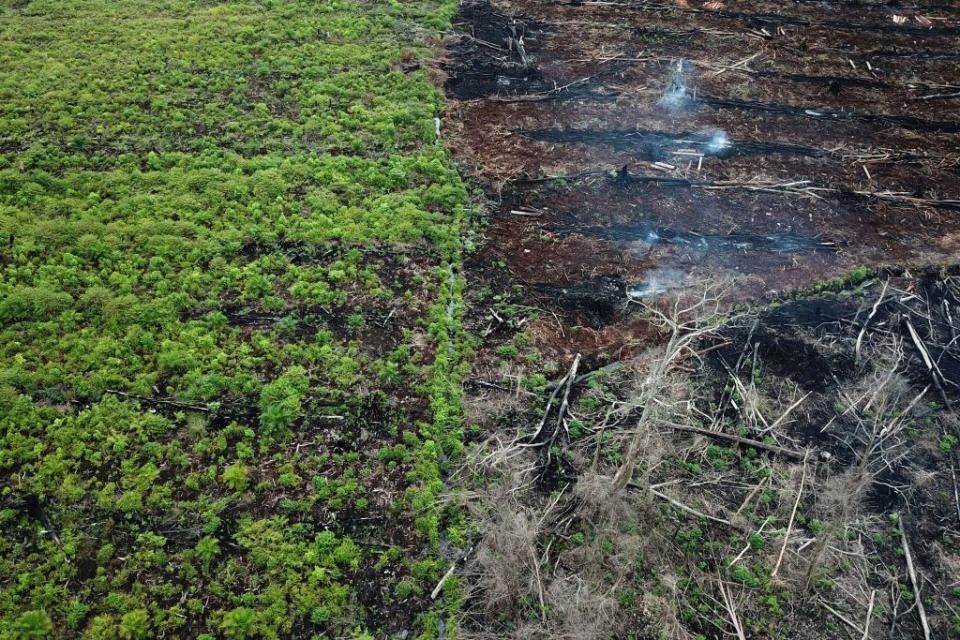The 'two little words' hiding a dark side to your favourite supermarket products
Lurking in countless food products sitting in your pantry and the aisles of your local supermarket is an ingredient known as palm oil - not that you’d necessarily know it.
Due to its increasingly controversial nature, for years countries in the European Union have mandated that palm oil be explicitly labelled on products. Other countries including the United States have also taken up stricter labelling laws.
But despite years of debate at home, the governing body responsible for food labelling in Australia and New Zealand has continued to allow palm oil to be hidden under a raft of generic terms such as vegetable oil.
This is despite major concerns about the environmental costs associated with the trade as demand for palm oil plantations fuels massive deforestation and threatens species.

The dark side of palm oil
There are two kinds of palm oil, which in the most basic terms is an edible vegetable oil derived from the fruit of palm oil trees.
It appears in a staggering amount of products such as bread, potato chips, margarine, ice cream, peanut butter, chocolate, instant noodles, detergent, shampoo, soaps and skin care products, and the list goes on.
Because of its relative low cost and versatility, the food industry loves it and it appears in about half of all packaged items on supermarket shelves.
About 85 per cent of the global supply of palm oil comes from Indonesia and Malaysia, according to the World Wildlife Fund, though at least 42 other countries also produce the oil.
The huge global demand for palm oil is fuelling mass land clearing to make way for palm plantations, destroying the habitat of orangutans, as well as other wildlife including tigers, rhinos and elephants, pushing some species to the brink of extinction.
A 2018 study published in Current Biology found that the demand for palm oil was linked to the loss of 100,000 Bornean orangutans between 1999 and 2015.

Monday this week marked international orangutang day and conservationists are urging Australian regulators to revisit the issue of mandatory labelling to give environmentally-conscious shoppers a better understanding of what they’re purchasing.
“[Food regulators] don’t see this as a real important issue to consumers,” says Maria Abadilla from the Orangutan Alliance.
“They’re response is that they are there to legislate around the quality and safety of the food.”
But the Orangutan Alliance - a global organisation dedicated to reforestation - hopes to change that by taking a more “consumer law” approach to sparking long-awaited change in Australia.
“Cage free eggs are legislated around consumer law, maybe we need to looking at other alternatives to give consumers choice in this issue,” Ms Abadilla said.
This is why we plant trees in Indonesia. #InternationalOrangutanDay pic.twitter.com/gODBxle2j5
— Ecosia (@Ecosia) August 19, 2019
Consumers in the dark
A 2017 bill brought by former South Australian senator Nick Xenophon, dubbed the Truth in Labelling - Palm Oil bill, sought to introduce mandatory labelling of palm oil.
Mr Xenophon argued that palm oil is not only a health risk (due to the high concentration of saturated fat) but an industry that is devastating for the planet and fatal for orangutans.
"Australians consume 10 kilos of palm oil every year and just don't know it," he said in a statement at the time.
The bill passed in the Senate but ultimately failed to pass the lower house and the issue has largely stalled ever since.
“We really need a new champion to raise it,” Ms Abadilla said.
Mr Xenophon’s claims were backed up at the time by a survey carried out by consumer protection group Choice, which found that only 15 per cent of Aussie shoppers surveyed in 2015 knew that palm oil could be labelled as vegetable oil on products.
Meanwhile Orangutan Alliance’s research has found that palm oil is the fourth most common ingredient Australian shoppers are looking out for when scanning supermarket products.
“It’s not like it would need a big logo, it’s just two little words,” Ms Abadilla said.

The push for sustainable palm oil
For a roughly $65 billion industry that supports a number of developing countries, it is unquestionably a complex issue.
A number of global food manufacturers have signed up to the Roundtable of Sustainable Palm Oil initiative, while a handful of different products on Australian supermarkets carry the Orangutan Alliance logo, designating if a product has palm oil in it.
According to the WWF, major Australian retailers including Coles, Woolworths and Arnott’s have been using 100 per cent certified sustainable palm oil in recent years, leading the way on the issue. But a handful of other companies are going backwards, it warns.
Until stricter labelling laws are brought in, the source of palm oil will remain a bug bear for Australian conservationists.

There are countless petitions online seeking to curb the impact of deforestation and environmental degradation brought about by the palm oil industry.
One petition aimed at cereal giant Kellogg’s has more than 670,000 signatures, and another addressed to the Australian Parliament calling for mandatory palm oil labelling on all products sold in Australia by January 2020 has more than 160,000 signatures.
A recent UK advertising campaign which went viral around the world after it was banned for being too political helped bring attention to the issue late last year. But in Australia it continues to bubble quietly under the surface, for the most part, out of sight.
Do you have a story tip? Email: newsroomau@yahoonews.com.
You can also follow us on Facebook, download the Yahoo News app from iTunes orGoogle Play and stay up to date with the latest news with Yahoo’s daily newsletter. Sign up here.



